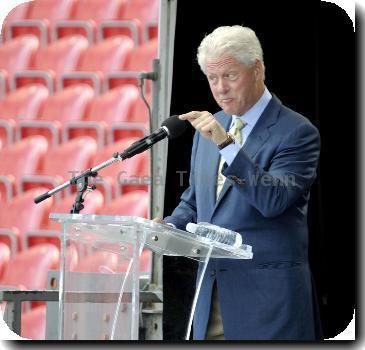Debris linked to tropical storm found in relief well, setting back work on stopping gusher
By Harry R. Weber, APSaturday, July 31, 2010
Debris in relief well sets back work on gusher
NEW ORLEANS — Tropical Storm Bonnie left crews working to plug the Gulf oil gusher a little memento that is expected to push their work back about a day.
Crews found debris in the bottom of the relief well that ultimately will be used to plug the leak for good, said retired Coast Guard Adm. Thad Allen, the government’s point man on the spill.
He said the sediment settled in the relief well last week when crews popped in a plug to keep it safe ahead of Bonnie.
“It’s not a huge problem,” Allen said, but removing the debris will take 24 to 36 hours and likely push a procedure known as a static kill back to Tuesday. That work had earlier been expected to begin late Sunday or early Monday.
The static kill involves pumping mud, and possibly cement, into the blown-out well through the temporary cap that has kept it from leaking for more than two weeks. Then comes the so-called bottom kill, in which cement pumped in from below the leak using the relief well will plug the gusher for good. The better the static kill works, the less time it will take to complete the bottom kill.
The blown-out well could be killed for good by late August, though another tropical storm could set the timetable back.
After the April 20 rig explosion that killed 11 workers, BP’s blown-out well gushed an estimated 94 million to 184 million gallons of oil before the temporary cap stopped it July 15.
There are signs that the era of thousands of oil-skimming boats and hazmat-suited beach crews is giving way to long-term efforts to clean up, compensate people for their losses and understand the damage wrought. Local fishermen are doubtful, however, and say oil remains a bigger problem than BP and the federal government are letting on.
Plaquemines Parish President Billy Nungesser emphasized that Saturday as he took a small group of reporters on a boat tour of an inlet at St. Mary’s Point, about an hour south of New Orleans. Fresh globs of thick oil saturated the marshes and brownish tar balls were visible in the water.
Even in areas where no oil was visible on the surface, workers were pulling up heavily stained boom that had been placed there in recent days.
Nungesser offered to prove it to incoming BP Chief Executive Officer Bob Dudley that there is still plenty of oil off the coast of Louisiana.
“Let me take him water-skiing out here and see if he comes up black,” Nungesser said.
Dudley, who has been heading BP’s oil spill recover efforts, rejected claims Friday that the impact of the spill has been overblown.
“Anyone who thinks this wasn’t a catastrophe must be far away from it,” he said in Biloxi, Miss., where he announced that former Federal Emergency Management Agency chief James Lee Witt will be supporting BP’s Gulf restoration work.
But relatively little oil remains on the surface of the Gulf, leaving less for thousands of oil skimmers to do. Dudley said it’s “not too soon for a scaleback” in the cleanup, and in areas where there is no oil, “you probably don’t need to see people in hazmat suits on the beach.”
For help with the long-term recovery, BP has hired Witt and his public safety and crisis management consulting firm. Witt, who was FEMA director under President Bill Clinton, said he wants to set up teams along the Gulf to work with BP to address long-term restoration and people’s needs.
“Our hope is that we can do it as fast as we can,” Witt said. “I’ve seen the anguish and the pain that people have suffered after disaster events. I have seen communities come back better than before.”
BP and Witt’s firm refused to say how much Witt will be paid for his work.
Commercial fishermen, meanwhile, were allowed back on a section of Louisiana waters east of the Mississippi River on Friday after federal authorities said samples of finfish and shrimp taken from the areas were safe to eat.
About 70 percent of Louisiana waters are now open to some kind of commercial fishing, but state waters in Mississippi and Alabama remain closed and so do nearly a quarter of federal waters in the Gulf.
Seafood industry representatives hailed the reopening, but Rusty Graybill, a boat captain from Ysckloskey, La., who fishes for crab, oysters and shrimp, said “it’s a joke.”
“I’m pretty sure I’ll go out and I’ll get oil-covered shrimp. They capped this well and now they’re trying to say it’s OK,” he said.
Graybill, a wiry 28-year-old with a leathery tan, made a 2-inch circle with his thumb and finger. “I’m still finding tar balls this big out there, and the boom is still covered in oil,” he said.
Oil rig workers are struggling along with fishermen because a federal moratorium on new deepwater drilling in the Gulf of Mexico. Those workers will be getting $100 million in aid that BP said Friday it will distribute through a Louisiana charity.
Harry Weber reported from Biloxi, Miss. Associated Press Writers Jason Dearen in Ysckloskey and Kevin McGill and Brian Skoloff in New Orleans contributed to this report.
Tags: Accidents, Bill Clinton, Biloxi, Coastlines And Beaches, Emergency Management, Environmental Concerns, Louisiana, Mississippi, New Orleans, North America, Storms, United States


